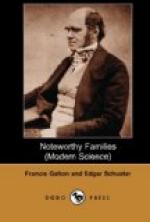CHAPTER III.—HIGHEST ORDER OF ABILITY.
No attempt is made in this book to deal with the transmission of ability of the very highest order, as the data in hand do not furnish the required material, nor will the conclusions be re-examined at length that I published many years ago in “Hereditary Genius.” Still, some explanation is desirable to show the complexity of the conditions that are concerned with the hereditary transmission of the highest ability, which, for the moment, will be considered as the same thing as the highest fame.
It has often been remarked that the men who have attained pinnacles of celebrity failed to leave worthy successors, if any. Many concurrent causes aid in producing this result. An obvious one is that such persons are apt to be so immersed in their pursuit, and so wedded to it, that they do not care to be distracted by a wife. Another is the probable connection between severe mental strain and fertility. Women who study hard have, as a class—at least, according to observant caricaturists—fewer of the more obvious feminine characteristics; but whether this should be considered a cause or a consequence, or both, it is difficult to say. A third, and I think the most important, reason why the children of very distinguished persons fall sometimes lamentably short of their parents in ability is that the highest order of mind results from a fortunate mixture of incongruous constituents, and not of such as naturally harmonize. Those constituents are negatively correlated, and therefore the compound is unstable in heredity. This is eminently the case in the typical artistic temperament, which certainly harmonizes with Bohemianism and passion, and is opposed to the useful qualities of regularity, foresight, and level common sense. Where these and certain other incongruous faculties go together in well-adjusted proportions, they are capable of achieving the highest success; but their heritage is most unlikely to be transmitted in its entirety, and ill-balanced compounds of the same constituents are usually of little avail, and sometimes extraordinarily bad. A fourth reason is that the highest imaginative power is dangerously near lunacy. If one of the sanest of poets, Wordsworth, had, as he said, not unfrequently to exert strength, as by shaking a gate-post, to gain assurance that the world around him was a reality, his mind could not at those times have been wholly sane. Sanity is difficult to define, except negatively; but, even




